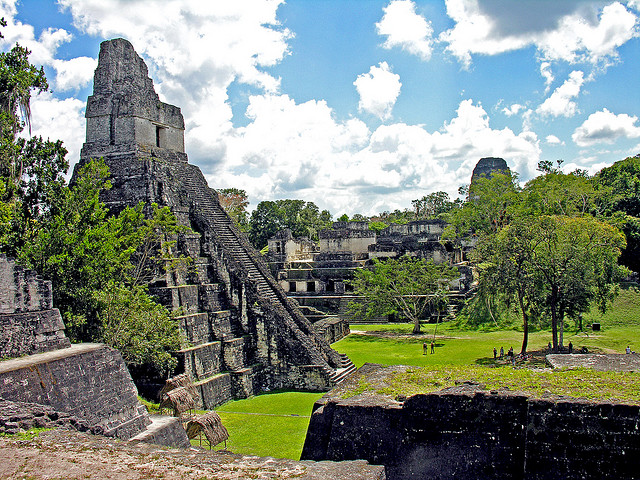
Abstract
‘Approaches
to Sustainability’ was part of a project of
the same name, and was organised as part of the programme of events for
the
Environmental Studies Research Network. The network intends to bridge
gaps
between disciplines in the field and to explore the synergies of the
work
taking place in different areas of the University of Warwick and beyond
by
creating a central hub for all the issues that surround sustainability.
The
intention is to allow researchers to communicate and collaborate across
disciplines, to gain a broader knowledge of work related to their own.
We feel
that the rich diversity of research carried out at the University of
Warwick
can and should act as a catalyst for exciting ideas that address the
complex
problems of sustainability. This account shares some of the main ideas
and
discussion points arising from the network’s conference in June
2013.

Figure
1: Guatemala (Source: Archer10, flikr)
‘Buenvivir’
and philosophical approaches
Johanna
Bergström’s discussion focussed on the meaning
and scope of the concept ‘buenvivir’, defined as
‘good living’. In contrast to
western philosophy of good living, which dwells primarily on the
wellbeing of
the individual, ‘buenvivir’, within the context of
indigenous ‘cosmovisions’ of
Latin American society, perceives the individual in the social context
of their
community and in a unique environmental situation. Put differently, the
concept
could be seen as an excellent example of philosophical and theoretical
engagement
with environmental issues. The paper, which centred on the Guatemalan
and Mayan
feminists’ concept of ‘buenvivir’ where it has been
institutionalised, was a
critique of the very idea of linear development and growth.
‘Buenvivir’ is a
major reaction against the way economic values dominate all aspects of
life,
with the attendant commodification of nearly everything that this has
led to.
Under ‘buenvivir’ philosophy, nature is seen as a
constitutive of social life,
with the economy forming part of larger social and natural systems.
Cultural
and historical perspectives
Dr.
Nick Lawrence used the work of theoreticians such as
Timothy Morton and Jason Moore to examine ecological poetry by Lisa
Robertson
and Kenneth Goldsmith. He linked poetic and theoretical interpretations
of
environmental crisis to the perception of ecology and economy by the
Frankfurt
School of philosophy, using these perspectives to interpret apocalyptic
and
utopian visions of our ecological future. Dr. Christian Smith similarly
drew on
the arts but with an historical perspective, cleverly revealing the
capitalist
sustainability and necrophilia within Bertolt Brecht's play Mutter
Courage und
ihre Kinder. As the drama’s events unfold, Mother Courage both
benefits from
and relies on war to sustain her family, but her children die at war,
leading
to the famous 'silent scream' scene. Dr. Smith’s paper was a
pioneering study
of the play’s presentation of environmental destruction during
the Thirty
Years’ War.

Figure
2: Mother Courage and Her Children: Alexandria
Wailes, Meryl Streep, Geoffrey Arend, and Frederick Weller. Photograph
by
Michal Daniel, www.playbill.com
In
Michela Coletta’s paper on ‘Hegel in America: nature
and identity in the twentieth-century Argentina’, an attempt was
made to examine
the challenge by the early 1960s Argentine anthropologist Rodolfo Kusch
against
Hegel’s historicism. Hegel situated Europe within the realm of
history, whilst
the ‘primitiveness’ of America was placed in the realm of
‘nature’. The
discussion brought into focus the contribution of Latin America to the
debate
on the whole question of the divide between nature and culture in the
western
world, which tends to be neglected.
Chris Maughanadded to this global contrast, explaining how in the
southern
hemisphere (such as South America and Africa) agro-ecological resistive
themes
are relatively common, especially in comparison to Northern literature.
Maughan
demonstrated that eco-agrarian thinking suffers from an avoidance of
the root
causes of food crises due to the use of mainstream actors and
institutions.
More recently, dedicated agro-ecological groups have been more focused
on the
initial causes and the hope is that this will continue.
Ecopoetry
Lancashire-based
poet Elizabeth Burns gave a reading of
her tranquilly beautiful poetry of landscapes both local to her and far
away.
She explored the lovely but treacherous seascape of Morecambe Bay,
Viking
graves by the seashore, limestone landscapes, the river Lune and its
role in
global migration, and the more disturbing days when the river was used
for the
transportation of slaves. In a more provocative approach, Mandy
Bloomfield’s
discussion, entitled ‘Unsettling Sustainabilit: A post
–equilibrium poetics?’,
centred on the exploration of literary modes which privilege flux,
instability
and incompleteness in their engagement with ecological questions.
Within this
context, the ecological poetics of two contemporary British innovative
poets,
Maggie O’Sullivan and Allen Fisher, were fully analysed. Whilst
O’Sullivan
adopted what was regarded as shamanistic approaches to the natural
world,
Fisher’s poetics drew on scientific ideas and language.
Nonetheless, both poets
enunciated principles of dynamism and uncertainty that tended to shift
the
focus usefully away from unsustainable ideals of ecological stability.
Our
exploration of interdisciplinary approaches continued
with insights from Professor Jonathan Skinner’s work on ecopoetry
and his
collaboration with scientists at Cornell University that explored how
the sounds
of nature can inform and inspire the sounds of poetry. Professor
Skinner
provided an unfamiliar view of the calls of familiar garden birds by
slowing
them down, allowing the listener to appreciate swift nuances of the
song that
would normally be inaudible to human ears. He also showed sound traces
of the
birds’ song. These recordings and images were used as the basis
for poetry that
echoes the sounds of nature.
Renewable
energy
Remaining
with the field of engineering, Dr Stuart Coles
reported on the successful project that was recently completed and
named ‘WorldFirst
Formula 3 Racing Car’.This is the first car built in the world
that shows how
synergies among virtuous industries in terms of environmentally
oriented
activities and operations can contribute to develop more sustainable
racing
cars, and as a consequence also conventional ones.

Figure
3: Formula 3 car. Further information, images, and
video available at http://www2.warwick.ac.uk/newsandevents/pressreleases/racing_car/
The
ideas behind this car are revolutionary as its
development required a full rethinking of how a car is made and how it
was
possible to obtain the same performance as the conventional ones by
using
materials defined as renewable and sustainable. As a result, except the
electronic equipment and the safety structure, the other components
have been
obtained by using a variety of natural and recycled products. Pulped
carrot
by-products were used to produce the steering wheel, while wing mirrors
were
based on materials derived from potato waste. Furthermore, resins made
from
recycled bottles have been used in the manufacture of the side pods,
and
recycled carbon fibres constitute most of the high performance body of
the car.
Lastly, the fuel was obtained from fermented wine waste, which would
have been
thrown away otherwise, and a specific lubrication system compatible
with the
renewable oil was developed, showing that powerful engines can be
developed and
work with renewable-based fuels.
Education
and the Future
Dr.Sam
Adelman made a rousing call to arms in the war
against climate change and urged the people in power to do something to
establish sustainability for our planet before it is too late. Adelman
described the need for both discussion and meaningful action in every
way
possible, and to set high targets for emission reductions rather than
sidestepping the issues at hand.
Dr.Ria
Dunkley, Research Fellow at the Institute for
Advanced Teaching and Learning, outlined how education for sustainable
development was an inadequate method for inspiring a profound change in
the way
students treat both the environment, and each other. She reaffirmed the
need
for an increased presence of education for sustainable development and
evaluated ecopedagogy as an alternative method for bringing ecological
awareness into higher education.
As
a Network, we will continue to explore the crucial
questions that have been raised through our work, including: What are
the
possibilities for future education to have a greater emphasis on the
environment in our curricula? Is 'sustainability' really the right term
to use
when talking about processes as changeable as weather systems, global
climate,
evolution and biodiversity? Is there hope for a new focus on
interdisciplinarity in the higher education system, and what would it
involve?
Further
information about the IAS Environmental Studies
Research Network at the University of Warwick is available at: http://www2.warwick.ac.uk/fac/cross_fac/ias/current/networks/environnetwork/